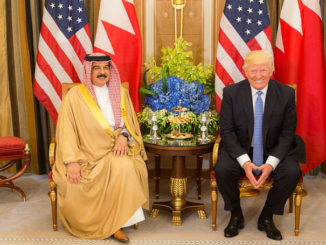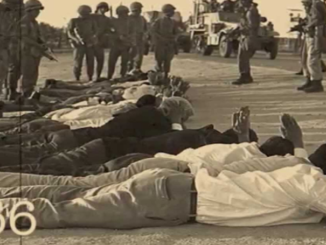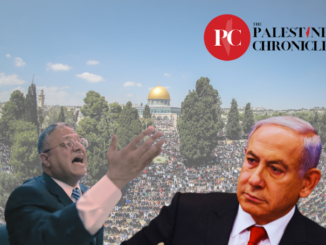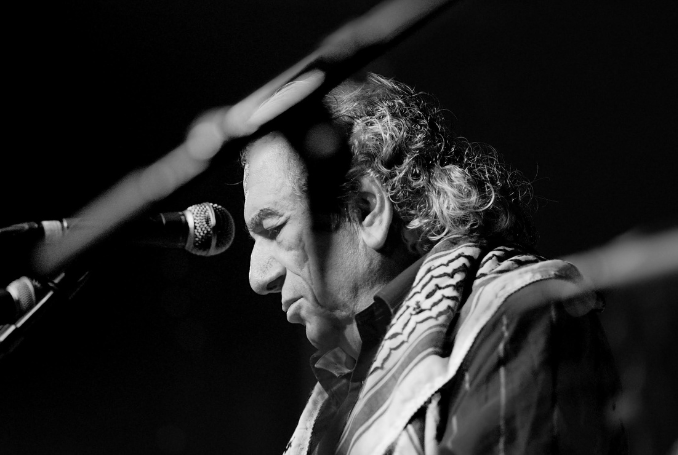
Fighting the ban, Leve Palestina is simultaneously a rebellion against proscriptions, right-wing media campaigns, and the constant attack on our right to solidarity with resistance.
Cultural effects of the Zionist genocide and the Gaza Resistance have compounded this now global confrontation. The steadfastness of the displaced, besieged, bombarded and massacred has seen hospital workers and families huddle together in song and poetry, while invading soldiers dance and defile the scorched land of Palestine.
Like all other phases of the Palestinian struggle, the present is enlivened by musical anthems. The prominence of Leve Palestina (Long Live Palestine), first performed a half-century ago by Palestinian-Swedish band Kofia, made it 2023’s “song of the year,” according to the Palestine Museum US. Faced with pro-Israeli censorship and condemnation, this is the song that refuses to be silenced.
Now in his eighth decade, Nazareth-born George Totari has been inundated, with cross-continental media keen to speak to the Leve Palestina songwriter. He admits to feeling tired, but friends and comrades know that, true to form, he will keep going.
I got to know George well in 2015-16, during production and filming for the documentary Kofia: A Revolution Through Music (2021), which tells the story of the band. Swedish and Palestinian musicians who he’d recruited to the cause after his 1967 arrival in Gothenburg described the unceasing drive of their band leader, attributed by flute player Bengt Carlsson to George’s Palestinian identity.
Kofia (a Swedish spelling of kuffieh) had attracted cult status as a pole of resistance culture the 1970s, performing in Scandinavia, Europe and revolutionary Iran, organizing participatory concerts and recording four albums; they added a fifth in 2022.
Leve Palestina vocalist Carina Olsson remembers joining the band after deciding to sing and jumping on stage – such was Kofia’s collective, communitarian environment where music and politics was for everyone. The song appeared on the group’s second vinyl record Mitt Hemlands Jord/Ard Biladi (Earth of My Homeland) in 1978 with the Swedish title Demonstrationssången, which Carina translates as “song of demonstration.”
Its Arabic title Tahiyya Falastin translated the Swedish Leve Palestina chorus. George explains that the song had been performed since around 1970 as a song for street protests for Palestine and a range of progressive causes.
The band had initially decided to keep the song firmly in this context and did not record it for their debut album Palestina Mitt Land/Falastin Baladi (Palestine My Land) in 1976. Sleeve notes described the song as “an attempt to reproduce the kind of spontaneous songs created during demonstrations in Palestine,” and “a dialogue” between the singer and the crowd.
The group would fall in and out of activity but, speaking openly of resisting Zionism and seeing socialism as the solution, the song became an anthem of the anti-imperialist left.
In recent years, Europe has become a battleground between Zionist ruling classes and pro-Palestine activists, with the former mobilizing state forces against opposition to Israel, conflated with hatred of Jews.
On May 1, 2019, protesters in Malmö, Sweden, sang Leve Palestina on the streets. Its lyrics were immediately quoted in parliament by prime minister Stefan Löfven of the ruling Social Democrats, attacking the song’s “unacceptable expression” of opposing Zionism.
The youth wing of Löfven’s party claimed to be leftists but backed down and agreed not to sing the song. This spinelessness repeated a global pattern whereby supposedly progressive social democratic forces played the leading role in Zionist witch-hunts, seen with Corbyn in Britain, Sanders in the US and, brutally, in Germany, where the Samidoun campaign is outlawed and associations named after revolutionary socialist Rosa Luxemburg openly lobby for Israel.
What has happened since Sweden’s attempts to ban and silence the message of Leve Palestina is nothing short of remarkable. Since October 7, 2023, the song has found new voice among tens of thousands of marching protesters across the country, as well as by activists blockading Israeli arms manufacturer Elbit.
According to Samidoun activist Lukas Göransson, the song and its reception enable “a kind of popular political education… In the Swedish context, one might paraphrase the revolutionary saying [of Irish struggler Bobby Sands]: ‘They tried to make us disappear but they didn’t know that we were a song.’”
Not only has this campaign of erasure failed in Sweden but Leve Palestina has become an international phenomenon. To young writer Sammy Baroud, the song is “a perfect example of how music can unite all people around a single, powerful cause,” pointing out its inspirations for many other protest anthems, narrowing the seeming distance between Palestine and the world.
Even before the most recent confrontation, Leve Palestina had been sung by Palestinian singers including Rola Azar, and in versions translated into many other languages. Those familiar with other intifadas of rebellious expression know the essential presence of the past to this fight for the future.
In Gaza, younger generations write and sing anew but maintain British-occupation-era songs like Mawtini (My nation) and Hizz al-Rimh (Shake the spear) as a key component of their transmission. As with these examples, George admits, Leve Palestina may well outlive its composer, as “a song of the people… even if we ourselves are no longer present to sing it.”
Fighting the ban, Leve Palestina is simultaneously a rebellion against proscriptions, right-wing media campaigns, and the constant attack on our right to solidarity with resistance.
An example to us all, its lyrics water nothing down, expressing the clear, principled message embraced by youth the world over.
Demonstrationssången/Tahiyya Falastin (lyrics by George Totari)
Long live Palestine and crush Zionism
Long live Palestine
We have cultivated the earth
And we have harvested the wheat
We have picked the lemons
And pressed the olives
And the whole world knows our land
Long live Palestine and crush Zionism
Long live Palestine
We have thrown stones at soldiers and police
And we have fired rockets against our enemies
And the whole world knows our struggle
Long live Palestine and crush Zionism
Long live Palestine
We will free our land from imperialism
And we will rebuild our land for socialism
And the whole world will witness
Long live Palestine and crush Zionism
Long live Palestine
Long live Palestine and crush Zionism
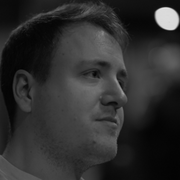
– Louis Brehony is a musician, activist, researcher and educator. He is author of the book Palestinian Music in Exile: Voices of Resistance (2023), editor of Ghassan Kanafani: Selected Political Writings (2024), and director of the award-winning film Kofia: A Revolution Through Music (2021). He writes regularly on Palestine and political culture and performs internationally as a buzuq player and guitarist. He contributed this article to The Palestine Chronicle.



